It’s one of the wealthiest countries in the world – with one of the best healthcare systems. But experts say Britain is lagging by one crucial metric: life expectancy.
In so-called ‘Blue Zones’ – areas of the world with the lowest rates of chronic disease – residents are more than 10 times more likely to live to 100 than in some deprived parts of the UK.
These regions – dotted across the globe – are home to the healthiest people in the world, and the oldest.
For decades, scientists have been fascinated by what makes the populations of Blue Zones so happy, mobile and free of chronic disease.
A popular docuseries on Netflix explored five such zones in 2023.
Titled Live to 100: Secrets of the Blue Zones, the series saw longevity expert Dan Buettner explore the lifestyle habits of locals in Okinawa, Japan, Sardinia, Italy, Nicoya, Costa Rica, Ikaria, Greece and Loma Linda, California.
Though geographically disparate, Mr Buettner found, people living in these areas followed the same nine simple habits – dubbed the Power 9.
Including regular exercise, intermittent fasting and focusing on family life, these lifestyle practices helped residents live longer, happier lives, the docuseries concluded.
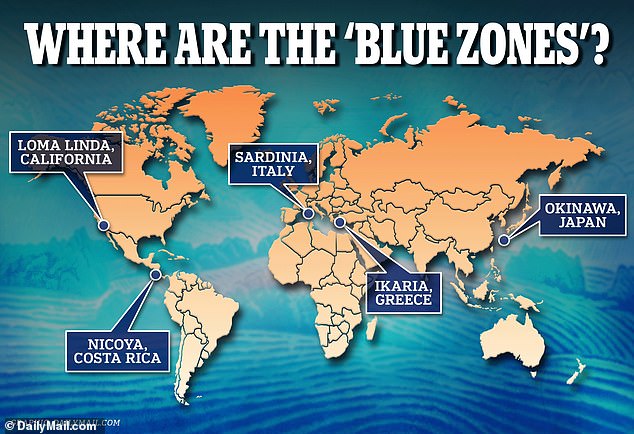
A docuseries on Netflix titled Live to 100: Secrets of the Blue Zones, delved into five places with ‘blue zone’ status: Okinawa, Japan ; Sardinia, Italy ; Nicoya, Costa Rica; Ikaria, Greece ; and Loma Linda, California
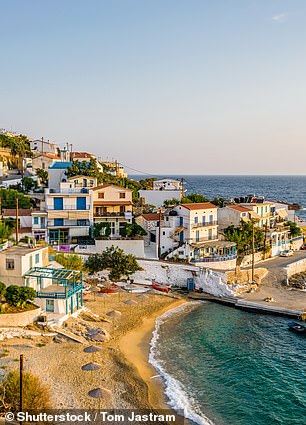
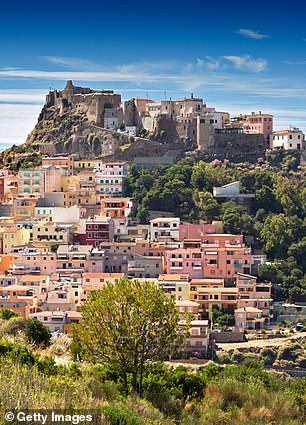
People live about eight years longer with no discernible dementia in Ikaria an island in Greece (pictured left). Men in Sardinia (pictured right) are statistically living the longest in the world
And a pioneering new study from researchers in Sweden revealed a further ‘superhuman’ ability that all people who live to 100 appear to share.
Centenarians have the remarkable capacity to avoid major illnesses – or accumulate them more slowly – the scientists found, despite living for far longer than their peers.
The findings challenge the widely held belief that a longer life inevitably comes with more years of poor health.
So, what are the secrets of living to 100…and how can YOU raise your life expectancy?
Diet
A major driver of longevity in blue zones is diet. Residents tend to favour plant-based foods, and only eat meat five times per month, says Mr Buettner.
Instead, diets in the Blue Zone tend to be rich in vegetables, legumes – like beans, peas and lentils, whole grains and nuts.
Sardinia, one of the five core ‘Blue Zones’, breaks a key ageing stereotype by having an equal number of male and female centenarians, which contrasts with global trends where five female centenarians exist for every one male centenarian.
The Sardinian diet generally consists of healthy wholegrains, beans, garden vegetables, fruits and olive oils, but locals also incorporate ‘wild greens’ into their diet.

Fibre filled and protein rich pulses such as beans, lentils and peas may be simple and cheap, but they provide essential nutrients. they can even add fur years to your life expectancy
This rather unique plant is known as amaranth – and is a great source of calcium, magnesium and potassium, as well as vitamin K, all essential minerals for bone health and muscle function.
In Seulo, a tiny town in the centre of Sardinia, with a population of fewer than 1,000, residents follow the aforementioned Sardinian diet, with another extra special ingredient that might just be the key to their longevity.
‘When locals couldn’t easily access animal protein, they decided to plant more than 400 walnut trees in public spaces,’ longevity expert Marcus Pearce told the Daily Mail.
Walnuts, often described as a ‘brain food’, have many health benefits.
Omega-3s and antioxidants in walnuts help lower cholesterol and reduce inflammation to help decrease heart disease risk, while their vitamin E and polyphenols support cognitive function and may protect against neurodegenerative disease.
They are also known to support beneficial gut bacteria, which is linked to improved immunity and reduced inflammation.
As well as snacking on walnuts, Seulo locals often incorporate them into meals such as salads or when baking biscuits and cakes.
Low consumption of meat also plays a role in the longevity of Blue Zone residents.
Studies have repeatedly shown that regularly eating red meat and processed meat can raise the risk of type 2 diabetes, coronary heart disease, stroke and certain cancers, particularly colorectal cancer.
Too much salt, on the other hand, can lead to high blood pressure, heart disease, and stroke.
Fasting
And it’s not just a healthy diet. Many in Blue Zone areas adhere to the 80 percent rule, whereby they stop eating when they are 80 percent full.
This prevents overeating and, in turn, obesity.
Studies in Okinawa, Japan suggest that before the 1960s, most residents were in a calorie deficit – eating fewer calories than they required – which experts believe could be contributing to their impressive longevity.
Okinawans also tend to follow the 80 per cent rule, which they call ‘hara hachi bu’.
The practice is deeply rooted in Okinawan culture as a principle of mindful eating – encouraging people to stop when they feel comfortably full rather than completely stuffed, and preventing them from overeating.
The average daily intake of an Okinawan is only about 1,900 calories, significantly less than the average number of calories consumed by a typical Brit.
Blue Zone residents also tend to eat their smallest meal in the late afternoon or early evening and then fast for the rest of the day.
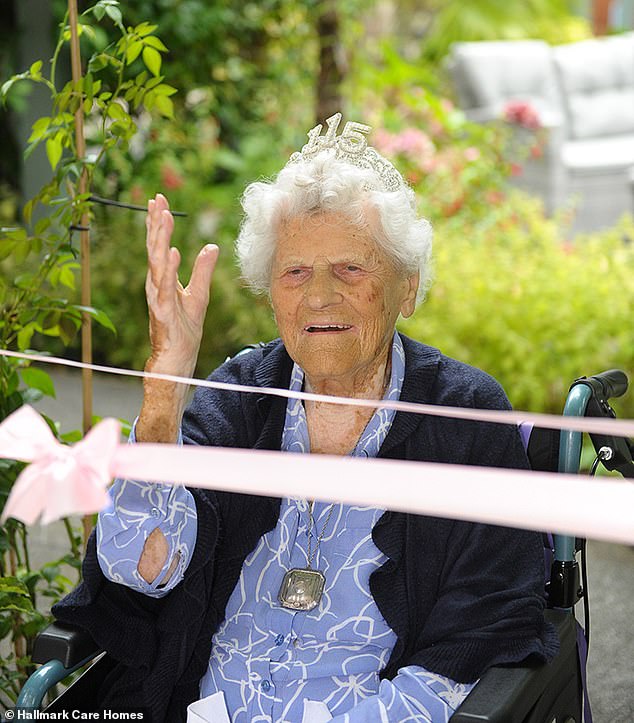
At the age of 115, Ethel Caterham, from Surrey, is the oldest living person in the UK following the death of 112-year-old Mollie Walker on 22 January 2022

Queen Elizabeth, the Queen Mother lived to the age of 101—she died in 2002 and was the longest living member of the Royal Family

Public figures who have lived to 100 include Hollywood star Kirk Douglas—father of actor Michael Douglas—who died in 2020, aged 103
Exercise
In Sardinia, a largely vegetarian diet, alongside daily physical activity, has led to the region having the highest concentration of male centenarians in the world.
Sheep herders in the area, who tend to walk at least five miles a day, as well as men with daughters, live even longer than most.
Loma Linda, California, was chosen for the Live to 100 docuseries because it is home to the highest concentration of Seven Day Adventists – a community who live 10 years longer than their North American counterparts.
The town was adopted at the turn of the 20th century by the health-focused founded of the evangelical Christian sect, after they purchased property in the area.
And their strict guidelines about food, exercise and rest have been passed down – with residents gaining notoriety today for their high levels of exercise, including walking fast and going to the gym.
While Britons tend to focus on strict exercise routines and structured gym workouts, elders in the Blue Zones don’t put too much pressure on themselves.
They remain active in other ways, such as tending to their garden, going for walks or doing chores.
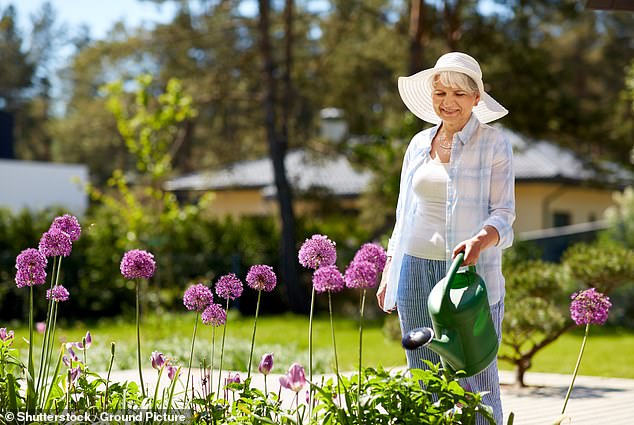
People living in blue zones tend to move naturally, which means building exercise into your everyday life, rather than joining a gym or running a marathon as a one-off
Family
Focusing on family and relationships, as well as having a strong social circle that values healthy living, is a crucial part of living to 100, experts have found.
Strong family connections are deeply embedded in the culture in both Italy and Greece; multi-generational households are common, as is living close to family members.
People in blue zones also put their loved ones first, have some sort of belief system and form social circles that support their healthy behavior patterns.
Mr Buettner attests that maintaining healthy relationships with family, friends and people of faith can extend lifespans.
Studies have shown that multi-generational households where grandparents look after their grandchildren have a higher chance of living longer.
And other research has found that maintaining social connections more generally in mid-to-late life can reduce the likelihood of neurodegenerative diseases like dementia by as much as 50 per cent.
Purpose
Having a purpose in life, or a reason to get up in the morning, can be worth up to seven years of extra life expectancy, Mr Buettner claims.
In Okinawa, this is known as ‘ikigai’ – referring to finding a sense of joy in one’s activities – while in Nicoya, residents refer to it as ‘plan de vida’.
Both roughly translate to the same thing, says Mr Buettner – a reason to wake up in the morning.
Having this life-purpose is associated with a reduced risk of death, possibly through psychological wellbeing.
Blue Zoners’ relaxing routines also help to combat any stress, which is known to cause chronic inflammation and is linked to every major age-related disease.
Seven Day Adventists in California pray, while other blue zone groups around the world take naps.
Sardinians partake in a happy hour, where they gather with friends and family at the end of the day to connect over a glass of wine.












